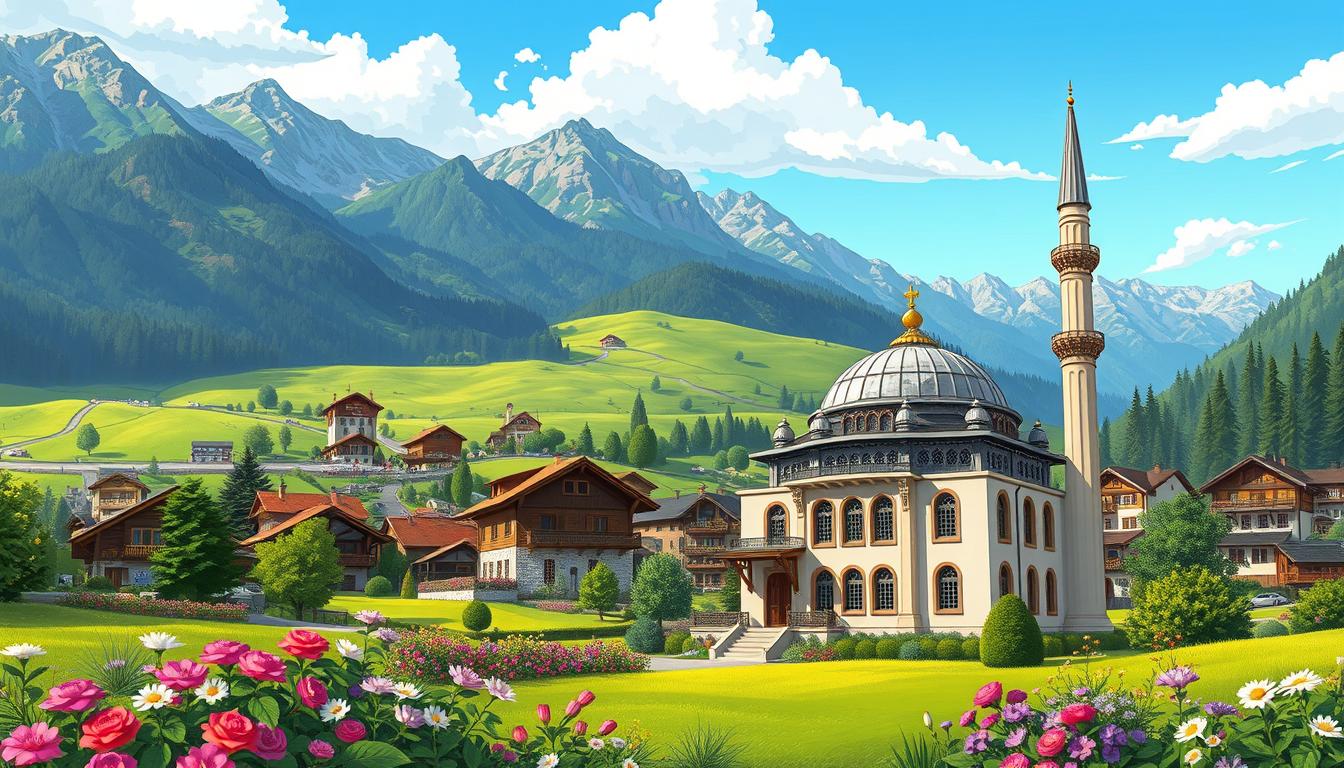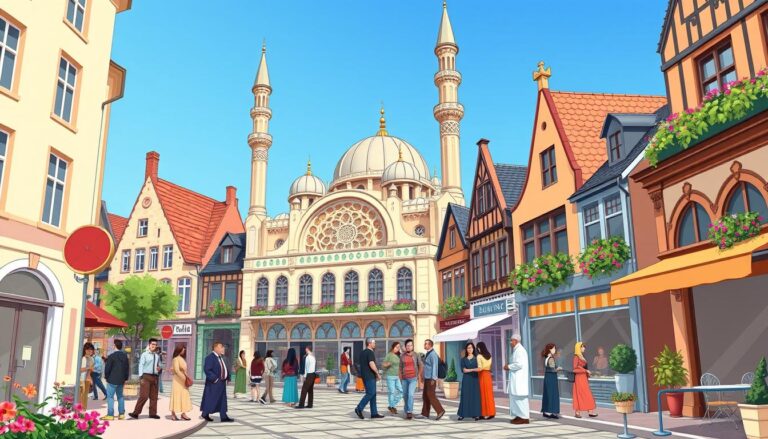Islam in Switzerland
Surprising as it may seem, Muslims make up a significant portion of Switzerland’s population, representing an estimated 5.5% or approximately 391,700 individuals as of 2019. This culturally diverse community has established a strong presence in the country, with a growing influence in various economic and political spheres.
The Muslim population in Switzerland largely comprises second or third-generation immigrants, with the largest percentages hailing from Turkey, Kosovo, and the Maghreb region. These communities have woven themselves into the fabric of Swiss society, contributing to the country’s vibrant Islamic culture and presence.
Interestingly, the distribution of Muslims in Switzerland is relatively equal throughout the country, with no administrative unit having more than 8.55% of the total Muslim population. Cities like Biel, Winterthur, Basel, Lausanne, St. Gallen, and Geneva have become hubs for this thriving community, reflecting the country’s commitment to religious freedom and diversity.
Key Takeaways
- Muslims make up 5.5% of Switzerland’s total population, amounting to approximately 391,700 individuals.
- The largest percentages of Muslims in Switzerland come from Turkey, Kosovo, and the Maghreb region.
- The Muslim population is evenly distributed across the country, with no single administrative unit having more than 8.55% of the total Muslim population.
- Cities like Biel, Winterthur, Basel, Lausanne, St. Gallen, and Geneva have become hubs for the thriving Muslim community in Switzerland.
- The Muslim community in Switzerland is culturally diverse and has established a strong presence in the country’s economic and political spheres.
Introduction
Islam has not enjoyed a long-standing tradition in Switzerland. The first mosque in the country was opened in Zurich in 1963 by the Ahmadiyya community. However, the Muslim population has grown significantly since the 1990s, particularly due to the influx of migrants triggered by the inter-ethnic wars in former Yugoslavia.
According to the 2023 Report on International Religious Freedom, the Muslim population in Switzerland has increased rapidly from 16,353 in 1970 to an estimated 400,000 persons today, accounting for around 5.5% of the total population. The largest concentrations of Muslim residents are found in the German-speaking Swiss plateau, with several cantons reporting more than 5% Muslim population.
Demographics and Distribution of Muslim Population
The cantons with the highest percentages of Muslim population include Basel-Stadt (8.17%), Glarus (7.72%), Solothurn (7.63%), St. Gallen (7.54%), Aargau (7.14%), Schaffhausen (7.02%), Thurgau (6.51%), Zurich (6.49%), and Geneva (6.24%). The Muslim community in Switzerland consists primarily of second or third-generation migrants from Turkey, Kosovo, and countries of the Maghreb region.
Despite some skepticism towards Islam, the religion has maintained its appeal, and conversion to Islam has not faded away. The Muslim community in Switzerland is generally younger and less well-educated compared to the general population, with a higher birth rate than the national average.
Historical Background
The early presence of Islam in Switzerland can be traced back to the 10th century, when Arabic-speaking Muslims from their Mediterranean Fraxinet base settled in the Valais region for a few decades. These Muslim settlers occupied the strategic Great St. Bernard Pass and even managed to reach as far north as St. Gallen and east into Raetia.
However, after this brief period of Islamic influence, the religion was virtually absent from Switzerland until the 20th century. The significant growth of the Muslim population in the country coincided with the wave of immigration to Europe following World War II.
- In the 10th century, Early Islamic presence in Switzerland was marked by the settlement of Arabic-speaking Muslims from their Fraxinet base in Valais.
- These Muslim settlers controlled the Great St. Bernard Pass and expanded their reach to regions like St. Gallen and Raetia.
- Islam remained virtually absent from Switzerland until the post-World War II period, when increased immigration to Europe led to the growth of the Muslim population in the country.
“The early presence of Islam in Switzerland can be traced back to the 10th century, when Arabic-speaking Muslims from their Mediterranean Fraxinet base settled in the Valais region for a few decades.”
The resurgence of Islam in Switzerland in the 20th century was closely tied to the broader trends of Muslim migration to Europe, driven by various social, economic, and political factors. This period marked the beginning of a significant shift in the religious landscape of the country, as the Muslim population grew and became more integrated into Swiss society.
Muslim Immigration to Switzerland
Switzerland has witnessed a significant influx of Muslim immigrants over the past few decades. This trend can be largely attributed to the Yugoslav war in the 1990s, which drove many Muslims from the region to seek refuge in Switzerland. The Muslim population in the country has grown rapidly, increasing from just 0.9% of the total population in 1980 to 5.4% in 2020. This surge is expected to continue, with projections indicating that the Muslim population could reach up to 12.9% by 2050 under a “high migration” scenario.
Reasons for Immigration and Waves of Arrivals
The reasons for Muslim immigration to Switzerland are diverse. In the 1970s and 1980s, many immigrants came for economic opportunities, while the 1990s saw a significant wave of refugees fleeing the Yugoslav war. The demographic profile of the Muslim community in Switzerland has also shifted over time, with a younger generation of Swiss Muslims emerging, often less accepting of the discrimination faced by their parents and grandparents.
- Muslim immigration to Switzerland accelerated dramatically in the 1980s and 1990s, with the number of Muslims increasing from 56,600 in 1980 to over 310,000 by 2000.
- The Yugoslav war in the 1990s was a major driver of Muslim immigration, as many sought refuge in Switzerland from the conflict.
- While the Muslim population continues to grow rapidly, the rate of growth has decreased since the early 1990s.
“In the ‘high migration’ scenario, the Swiss Muslim population is estimated to increase to 1,500,000 (12.9%) by 2050.”
The influx of Muslim immigrants has shaped the religious landscape in Switzerland, with the Muslim community becoming the largest religious minority in the country. However, this growing presence has also led to ongoing debates and challenges surrounding integration, discrimination, and the role of religion in Swiss society.
Islam in Switzerland
Ethnic and Regional Origins of Swiss Muslims
Switzerland’s Muslim population is diverse, reflecting the country’s rich immigrant history. According to the 2023 Report on International Religious Freedom, a staggering 88.3% of Muslims in Switzerland are of immigrant background. The largest groups hail from the former Yugoslavia, with 56.4% of Swiss Muslims originating from countries like Bosnia and Kosovo. Another significant portion, 20.2%, trace their roots to Turkey.
Beyond these dominant groups, the Muslim community in Switzerland also includes individuals from North Africa, the Middle East, and other parts of the world. Approximately 6% of Swiss Muslims are from Africa, contributing to the ethnic and cultural tapestry of the country’s Islamic landscape.
Sunni and Shia Branches of Islam in Switzerland
The vast majority of Muslims in Switzerland, around 75%, adhere to the Sunni branch of Islam. A notable minority, representing 10 to 15% of the Muslim population, belongs to the Alevi sect, a distinct form of Shia Islam. The remaining 10% or so are Shia Muslims or members of other smaller Islamic denominations, such as the Ahmadi.
This diversity within the Swiss Muslim community reflects the global divisions within the religion, with Sunnis and Shias maintaining distinct theological and cultural traditions. Understanding these nuances is essential for appreciating the richness and complexity of Islam’s presence in Switzerland.
“The Muslim community in Switzerland consists mostly of individuals of Turkish, Bosnian, Albanian, and North African origin.”
Notable Swiss Muslims
Switzerland, a country known for its natural beauty and economic prowess, is also home to a diverse Muslim community. Among the notable Swiss Muslims are several individuals who have made significant contributions in various fields, showcasing the richness and dynamism of this community.
Tariq Ramadan, a renowned Swiss philosopher, theologian, and academic, has been at the forefront of Islamic scholarship and discourse. As a Professor of Contemporary Islamic Studies at the University of Oxford, Ramadan has authored numerous books and articles, exploring the intersection of Islam, modernity, and social justice.
Another prominent figure is Frithjof Schuon, a Swiss metaphysician and Sufi teacher, who was a key figure in the Traditionalist School of Islamic thought. Schuon’s works have had a lasting impact on the understanding of the perennial wisdom at the core of various religious traditions.
The world of art and culture has also seen the contributions of Swiss Muslims, such as Titus Burckhardt, a renowned art historian and scholar who specialized in Islamic art and architecture. Burckhardt’s writings have been instrumental in preserving and promoting the rich artistic heritage of the Muslim world.
In the realm of sports, Swiss Muslims have also made their mark. Granit Xhaka and Xherdan Shaqiri, both of whom have Albanian roots, are professional footballers who have represented the Swiss national team with distinction.
The diversity of Swiss Muslims is further exemplified by the life and work of Isabelle Eberhardt, a Swiss-Algerian explorer, writer, and Sufi convert, who left an indelible mark on the literary and cultural landscapes of North Africa in the early 20th century.
These notable Swiss Muslims, and many others, have enriched the social, intellectual, and cultural fabric of Switzerland, showcasing the valuable contributions of this vibrant community.
“The Muslim community in Switzerland has a long and rich history, with individuals who have made significant contributions across various fields. Their stories are a testament to the diversity and integration of this community within Swiss society.”
Growth and Concentration
Switzerland has witnessed a steady increase in its Muslim population over the past decades. According to the 2023 Report on International Religious Freedom, certain cantons in the country have emerged as hubs with the highest Muslim population percentages.
Cantons with the Highest Muslim Population
The cantons with the largest Muslim populations are:
- Basel-Stadt (8.17%)
- Glarus (7.72%)
- Solothurn (7.63%)
- St. Gallen (7.54%)
- Aargau (7.14%)
- Schaffhausen (7.02%)
- Thurgau (6.51%)
- Zurich (6.49%)
- Geneva (6.24%)
In contrast, the canton with the lowest percentage of Muslims is Ticino, the Italian-speaking region, with only 1.82% of its population identifying as Muslim.
“The growth of the Muslim population in Switzerland reflects broader demographic trends observed across Europe, with the continent’s Muslim population expected to rise from 44.1 million in 2010 to over 58 million by 2030.”
The concentration of Muslims in certain Swiss cantons can be attributed to various factors, including patterns of immigration, economic opportunities, and demographic shifts. As the country continues to evolve, understanding these regional variations in Muslim population will be crucial for policymakers and local communities to address the unique needs and challenges faced by this diverse community.
Islamic Organizations and Mosques
Swiss Muslim organizations began to form in the 1980s, with the establishment of an umbrella organization, GIOS (Gemeinschaft islamischer Organisationen der Schweiz), in Zurich in 1989. Numerous other Islamic organizations in Switzerland were formed during the 1990s and 2000s, including VIOZ (Vereinigung Islamischer Organisationen Zürich), Basler Muslim Kommission, KIOS (Koordination Islamischer Organisationen Schweiz), VIOKL (Vereinigung islamischer Organisationen des Kantons Luzern), and FIDS (Föderation Islamischer Dachorganisationen in der Schweiz).
Umbrella Organizations and Their Roles
The Association of Islamic Organisations in Zurich (VIOZ), formed in 1995, is one of the most prominent Islamic organizations in Switzerland. VIOZ has more than 30 member organizations and operates over 40 mosques in the Canton of Zurich, covering approximately 90% of the mosques in the region. VIOZ collaborates with two national organizations, the Federation of Islamic Umbrella Organizations in Switzerland (FIDS) and the Coordination of Islamic Organisations Switzerland (KIOS), to advocate for the interests of the Islamic organizations in Switzerland.
Mosques in Switzerland
It is estimated that there are 260 mosques and prayer rooms with connected services in Switzerland. Compared to the European average, Switzerland has the second lowest number of mosques in Switzerland per Muslim inhabitant, with about one mosque to every 4,000 Muslims in the country. The mosque distribution in Switzerland shows that the Muslim population is evenly spread across the country, with 73% residing in major urban centers, notably in the cantons of Zurich, Aargau, St Gallen, and Bern.
“The Muslim population is estimated between 200,000 and 250,000 people currently (2.8% to 3.5% of the resident population), with estimations provided by non-governmental agencies like Islamic associations.”
Integration and Challenges
The integration of Muslims in Switzerland has been a complex and multifaceted process. While the Swiss government has taken steps to support the Muslim community, such as increasing funding for security improvements on minority religious facilities, the community continues to face significant challenges.
Efforts Towards Integration
According to the 2023 Report on International Religious Freedom, the Swiss government has increased its annual funding for security improvements on facilities of minorities threatened by terrorism or violent extremism, from 500,000 francs ($597,000) to 2.5 million francs ($2.9 million). This investment demonstrates the government’s commitment to ensuring the safety and well-being of the Muslim community in Switzerland.
Challenges Faced by Muslim Immigrants
Despite these efforts, the Muslim community in Switzerland continues to face various challenges, including incidents of Islamophobia and discrimination. The report cites a concerning increase in anti-Muslim threats and discriminatory incidents following the October 7, 2022 Hamas terrorist attacks on Israel, with wearing the hijab being a common trigger for discrimination. Furthermore, a June 2023 study by the European Network against Racism, in collaboration with the Federal Commission against Racism, found 44 incidents against Muslims in 2022, compared to 53 in 2021.
The challenges faced by Muslim immigrants in Switzerland are further highlighted by the school completion rates for second-generation Muslim immigrants, which show that 74% leave school before the age of 17. Additionally, a 2017 study by the Federal Commission Against Racism (EKR) found that 54% of Swiss print media articles on Islam focused on themes of “radicalisation” or “terrorism”, contributing to the perpetuation of negative stereotypes and misconceptions about the Muslim community.
“35% of Swiss Muslims reported experiencing discrimination within the past 12 months.”
Despite these challenges, the Integration of Muslims in Switzerland remains a priority, with the government and civil society organizations working to address the Challenges faced by Muslim immigrants and promote Islamophobia in Switzerland. The success of these efforts will be crucial in fostering a more inclusive and equitable society for all.
Legal and Political Landscape
The legal and political landscape in Switzerland regarding Islam is marked by a delicate balance between religious freedom and public policy. The Swiss constitution guarantees the freedom of faith and conscience, prohibiting discrimination against any religion or its members. However, the country has also enacted laws that regulate religious practices, such as the ban on full facial coverings, including the burqa and niqab, in public spaces. Individuals who violate this law can face fines of up to 1,000 Swiss francs ($1,200), with some exceptions.
The canton of Geneva, in particular, has been proactive in addressing religious neutrality in the public sector. In 2019, the canton implemented a law that prohibits all cantonal government officials from wearing visible religious symbols in the workplace. This measure aims to maintain a separation between state and religion, ensuring that public service remains impartial and accessible to all citizens, regardless of their religious affiliation.
While the Swiss legal framework generally protects religious freedom, the specific regulations and recognition of religious communities can vary from canton to canton. The Cantons of Basel, Zurich, and Vaud, for example, offer legal recognition to religious communities as private entities, granting them certain privileges and benefits. However, the tax-exempt status granted to religious groups is not uniform across the country, as it is determined by the individual cantons.
Source Links
- Islam – eurel
- Islam in Switzerland
- Embracing Islam in Switzerland: (Re-)Conversion Between Searching for the Meaning of Life and Social Ties
- Muslims and Jews in Switzerland
- Negative views of Islam in Switzerland with special regard to religiosity as an explanatory factor – Zeitschrift für Religion, Gesellschaft und Politik
- Swiss Muslim population to grow, migration or not
- The challenges for young Swiss Muslims after 9/11
- Whose freedom? The Muslim headscarf controversy in Switzerland
- Islam and Muslims in Switzerland Through the Prism of Religious Visibility and Islamic Militancy
- Switzerland – United States Department of State
- Switzerland referendum: Voters support ban on face coverings in public
- How anti-Muslim sentiment has gone mainstream
- Region: Europe
- SGI 2022 | Switzerland | Quality of Democracy
- Muslim Trade and City Growth Before the Nineteenth Century: Comparative Urbanization in Europe, the Middle East and Central Asia | British Journal of Political Science | Cambridge Core
- Association of Islamic Organizations in Zurich
- Islam in Switzerland (Dawah)
- Survey finds Muslims well integrated into Swiss society
- Switzerland – United States Department of State







